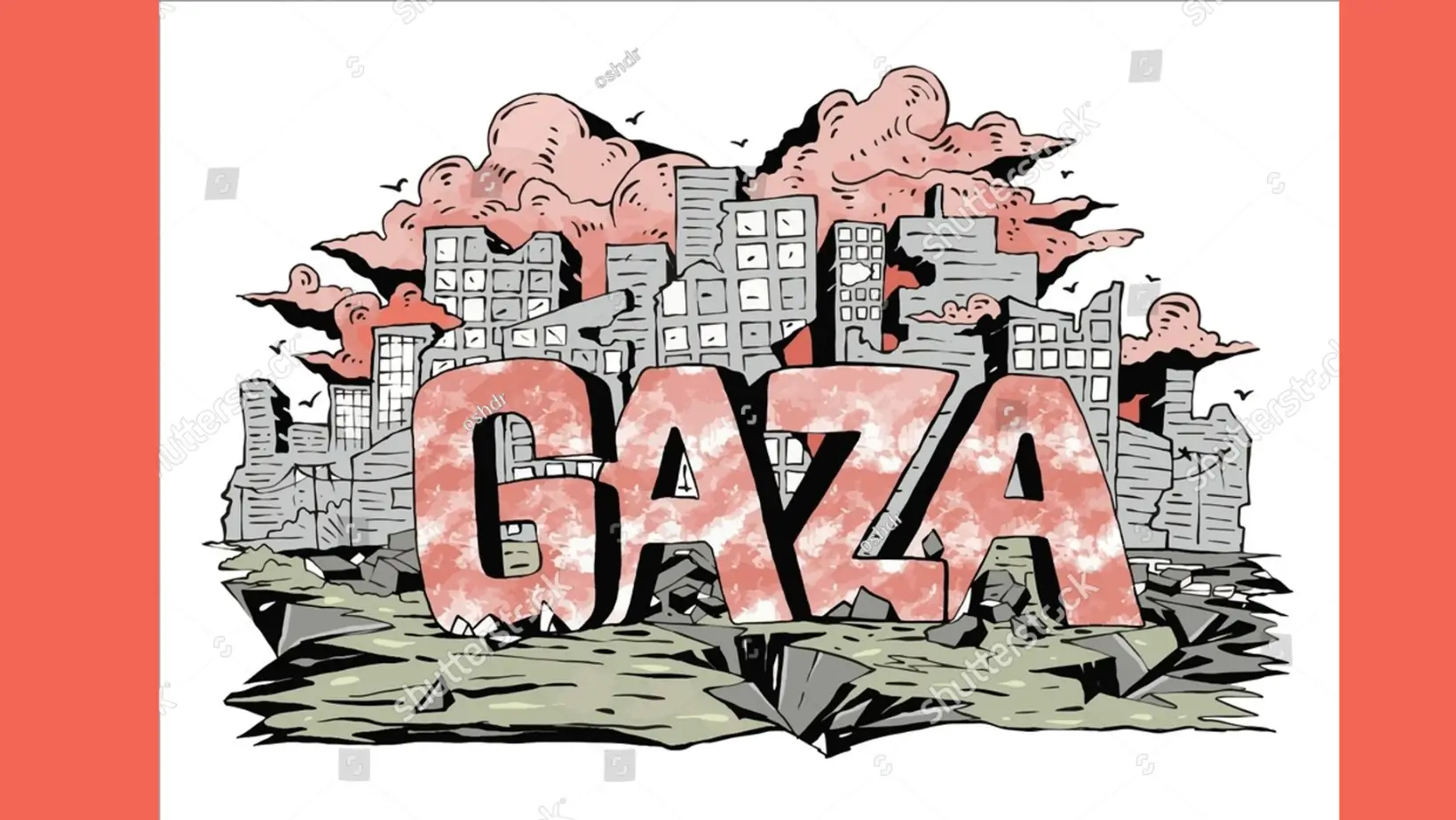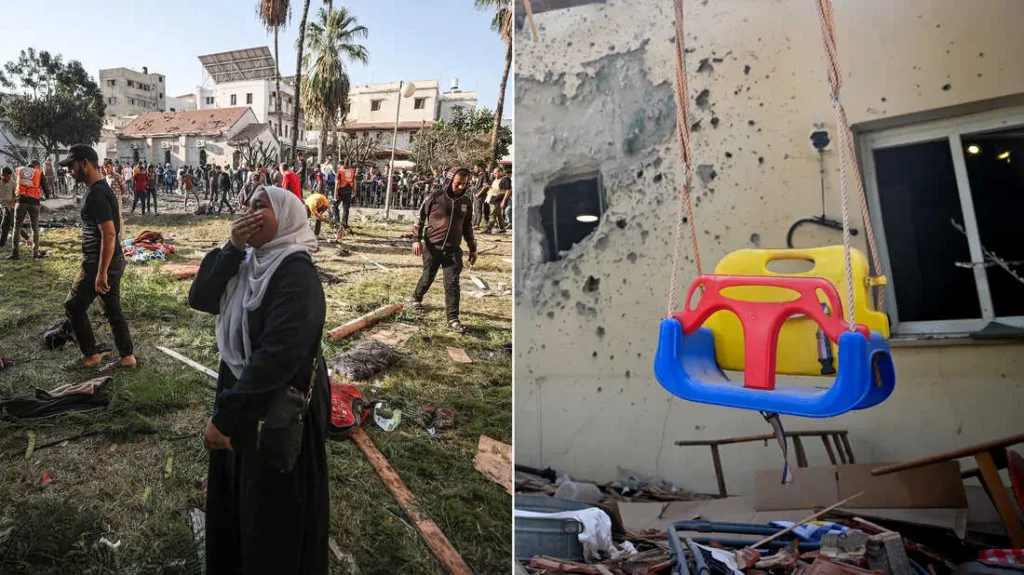
Did you know
• Experts now formally call the famine in Gaza the first famine in the Middle East as monitoring began.
• Over 500,000 people are in catastrophic hunger. That number could go up to 640,000 by September.
• Children suffer the most. Over 12,000 children were acutely malnourished in July.
• A hospital strike killed a reported 22 civilians, as well as journalists and health staff.
• The United Nations called the strike a “double-tap” attack. That strike destroyed the last functioning medical center in southern Gaza.
• The war has gone on since October 2023. It has deeply devastated homes, farms, schools, roads, and hospitals.

The Current State of Play
Air and ground offensive military operations continue to be carried out by Israel in Gaza. Civilians in the region continue to suffer from extreme hunger and are watching aid being blocked; consequently, families remain displaced and struggling to survive.
Starvation has reached Gaza City, where over half a million people are facing starvation. Several aid organizations have described the situation as “man-made” and have requested an immediate ceasefire, while donors must provide food quickly.
Journalists and podiatric medics operate as if they are in a hostile war zone. On August 25, an Israeli “double tap” strike on Nasser Hospital hit the site two times, killing 22 people, including several journalists and rescuers. At the time, Gaza’s health system had been devastated by nearly 2 years of war, while the aid remained trapped behind barriers to interventions. Survivors are climbing over rubble to access food, and travelers are waiting for hours in danger zones.
Read more: Beyond Tidy: The Reality of OCD
Recent Statistics
- Over 62,000 Palestinians have died since October 2023, with half of these dying within twenty-two months of the conflict’s escalation.
- 514,000 people are currently threatened by famine, which is projected to rise to 641,000 by September.
- In July, over 12,000 children were acutely malnourished, up sixfold since early 2025.
- In 2025, there were 74 malnutrition-related deaths; 63 of these happened in July alone.
- 83 % of the deceased Palestinians were civilians according to an Israeli intelligence-based report.
Case Studies
Starvation: A family literally starved to death not far from an aid center. A child died before anyone got to them. The child didn’t die for lack of rescue; the rescue didn’t arrive in time.
Hospital strike: Emergency services came rushing in to Nasser Hospital just after the first bombing. There was a bilateral impact, there was a second strike, and the second strike caused indiscriminate harm to doctors, the media, and wounded people. These examples reflect deliberate targeting/random killing. It hardens the human mind and heart.
Psychological Perspectives
Every day, individuals suffer traumatic stress. They fear bombs, hunger, and losing loved ones. They feel hopelessness. Yet they remain resilient. They get pleasure from the little things, such as a smile from a child or a friendly neighbor. Children will face scars that will last. They see death, hunger, and fear. Those visuals may remain with them for life. They may develop anxiety or depression. Therapy and safe places can help. When families come together to cope with trauma, they can be stronger together. They can provide comfort to each other. Togetherness can heal a broken mind. They experience hope despite dark times.
Islamic Perspective
Islam promotes the sanctity of life. It prohibits killing innocents. Muhammad (peace be upon him) said, “Do not harm the vulnerable.” Starving those in need is a violation of that teaching.
Islam calls for compassion. The Quran instructs to feed the hungry. It instructs to care for orphans and widows. The teaching requires access to aid. It requires respect for hospitals, journalists, and civilians.
The Psychological Burden of War
In Gaza, the people are in a state of mental strain. Their days are filled with sirens, hunger, and bombings. The tool of constant fear drives their brains into
A survival response. According to the psychologists, this stress creates trauma, and when people experience trauma daily, their brains will literally change. They may develop anxiety, they may lose hope, some will have difficulty with sleep, and memory regulation. Some are numb because their minds can’t cope. However, there is resilience, even in
Despair; families hold hands still, they share bread still,
And one small act gives psychological power.
Read more: Balochistan: A Tragic Honour Killing Case
Children and Longevity in Mental Health
Children bear the heaviest scars. They experience violence in the home and on the street. They hear explosions and screaming for hours on end. The images come in, and the staying power of images is long. Psychology has demonstrated that trauma at a young age has impacts that can last a lifetime. Some children become fearful or withdrawn. Some children become aggressive and mistrustful. In both cases, they are defending against pain. War steals childhood joy.
Some children don’t even play or learn how to play. Teachers see children with shorter tempers and glazed looks. Clinicians warn them that they are at risk for depression and anxiety for a long time, if not forever. Without juvenile safe spaces, there is a substantial chance that acute stress can transition and impact the next generation. Studies of survivors in other wars demonstrate this risk. A child’s healing takes time, care, therapy, and love. Even temporary spaces of safety matter. In safe environments, children’s brain absorption begins to heal. When children begin to feel hope, they begin to reconstruct engagement, resilience, and well-being.

Concluding Thoughts
War affects everyone. Gaza suffers in devastation, destruction, and deprivation. One horrible combination of experiences is happening simultaneously. People are subject to trauma, hunger, trauma. And now journalists and doctors are dying too. We can’t ignore this tragedy. For the sake of the human mind, we have to bring shelter, food, medicine, and peace. For the sake of Islamic practices, we have to save lives, protect the weak, and protect innocent lives. Also, for the sake of moral reaction, we need to stop this war and build relief. Working for humanity’s interest now would integrate the potential to value human life. It would stop suffering. It would give hope.
In the wreckage, human beings still strive for hope. Neighbors help neighbors. Parents hum lullabies to their children. Essential is faith. A belief in justice keeps people afloat in despair. In psychological terms, hope serves as a buffer. It gives suffering meaning. It helps victims to persevere. There will always be scars, but hope takes the edge off the pain. Healing is a gradual process, but there is strength in the people of Gaza.



Leave a Reply